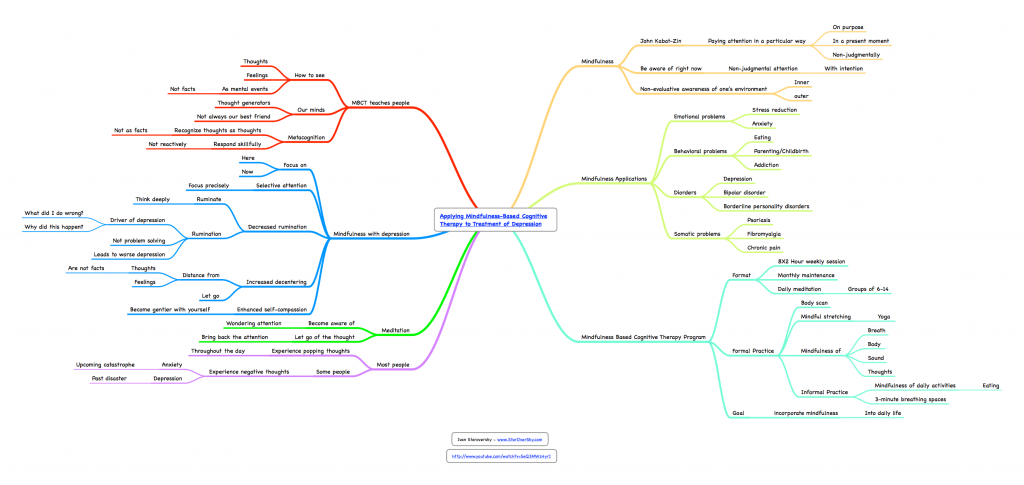
Cognitive-behavioral therapy (CBT) is considered to be one of the most effective and most researched methods of treatment for stress related disorders. However, a meditation approach called mindfulness-based cognitive therapy (MBCT) is quickly gaining more popularity in treatment of various disorders including depression. MBCT has the potential to improve one’s well-being, mindfulness, emotional regulation, positive mood, and spiritual experience while reducing stress, anxiety, and other problems. Dr. Eisendrath suggests that applying MBCT to treat depression can be a very effective approach.¹
According to Jon Kabat-Zinn², mindfulness can be defined as paying attention in a particular way on purpose in a present moment and non-judgmentally. Mindfulness is not a state of doing but a state of being in which you are fully aware of the present moment and do not evaluate your inner or outer environment. Mindfulness is a state of self-regulation of your attention and the ability to direct it towards breathing, eating, or something else. Curiosity, openness, and acceptance are all part of being mindful.
Applications of mindfulness include emotional problems such as stress and anxiety; behavioral problems such as eating, parenting, and addiction; disorders such as depression, bipolar disorder, and borderline personality disorders; somatic problems including psoriasis, fibromyalgia, and chronic pain. Dr. Eisendrath suggests that people experience popping thoughts on the daily basis and many of these thoughts can be negative depending on the your level of stress.
To cope with negative popping throughs, you can use meditation to train yourself to become aware of your wondering thoughts and bring back your attention to the present moment. People who are depressed, often have lots of negative popping thoughts about their past. A combination of mindfulness based stress reduction and cognitive therapy has been shown to be very effective for treatment of depression.
MBCT was originally developed as a relapse prevention program to help people stay free of depression once they have fully recovered from an episode. In the study about depression treatment methods, many more people people who were treated with MBCT have stayed free of depression (about twice as many). These results were confirmed by a repeat study. Other studies have showed that the results achieved by MBCT were equivalent to the results achieved by antidepressants. Moreover, people who have bee trained in MBCT experienced less depression and significantly improved their quality of life.³
MBCT
CBT
To achieve significant positive results with the treatment of depression it is recommended to practice daily meditation for at least eight weeks. Mindfulness based meditation includes body scanning, mindfulness stretching, some elements of yoga, mindful breathing, [mindful eating][Eating a Raisin, and other daily mindful practices.
Self-Compassion means acceptance of thoughts without judgement and softening of self-criticism.
In the study about depression treatment methods, many more people who were treated with MBCT have stayed free of depression (about twice as many). These results were confirmed by a repeat study. Other studies have showed that the results achieved by MBCT were equivalent to the results achieved by antidepressants. Moreover, people who have been trained in MBCT experienced less depression and significantly improved their quality of life.
Although, MBCT requires training and time to achieve significant results, this intervention is much cheaper than antidepressants in the long-term. Unlike medication, MBCT does not have any negative side-effects and helps people improve the quality of their life, increase concentration and awareness, and respond to negative thoughts and experiences more skillfully.
Over the past decades there has been a lot of effort done towards educating people about the importance of physical exercise. Perhaps the same should be done about mindfulness based practices. The world is getting more complex and people need portable, cheap, and effective methods of stress management and coping. MBCT can be one of these methods as long as people are taught how to use mindfulness in their daily life. Problem prevention is cheaper and better than spending time and energy trying to find solutions to complex problems like depression and psychosomatic problems.
Click the image to enlarge
References:
Credit (CC4): staroversky.com/blog/applying-mindfulness-based-cognitive-therapy-to-treatment-of-depression